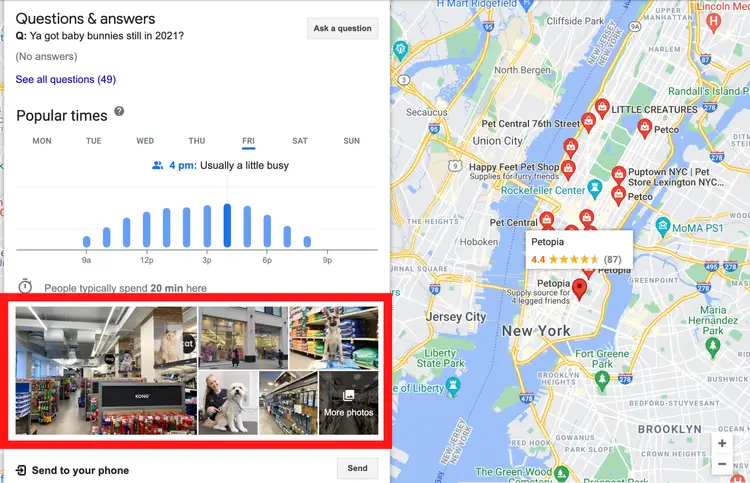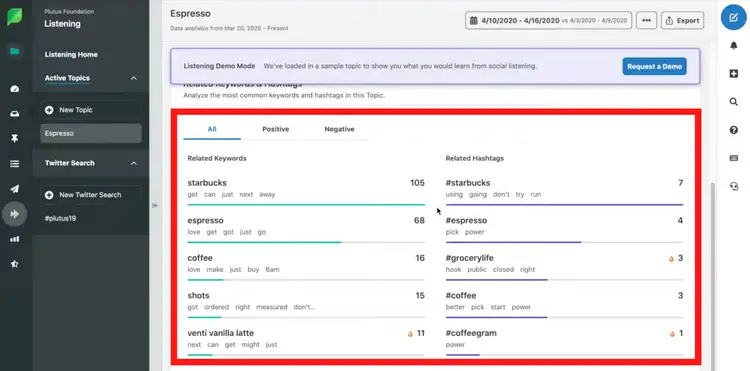
12 Quick Local SEO Audits That You Can Do In No Time
As a local business owner, if you want to compete with other local businesses and local search ranking, you need to conduct a local SEO audit.
The best way to beat your competition is to determine where you stand and what you need to fix and devise a strategy to overtake them.
Audits may seem daunting, but there's no need to be concerned. Using our comprehensive checklist, this guide will show you how to conduct a local audit in less than 30 minutes.
Quick Audit #1: Updating Google My Business Listings
Local SEO relies heavily on Google My Business listings. Here are some tips for auditing your GMB listings:
1. Do You Have Any Duplicate Listings?
Find and destroy any duplicate Google My Business pages. Duplicate listings can be one of the greatest threats to your local SEO.
2. Check Whether Your Listings Have Received A Penalty.
A manual penalty is levied by human employees, whereas algorithms levy a search engine penalty. Penalties are difficult to find since Google does not notify about the penalty. But generally, you can find manual penalties in your Google Search Console.
3. Is Your Business Listing Verified And Claimed?
Verify and claim your listings in GMB to get the most from this service.
4. Are You Using Proper Categories?
Since there are no custom categories, as per Google, you should use all the categories that describe your business and not what it does.
5. Do Your Listings Have Images And Videos Of Your Business?
Make sure they represent your business correctly and are of high quality. If not, change them immediately.
Here are a couple of screenshots from the Google My Business listing of a New York-based Pet Store


Read: Step-by-step Setup Guide for Google My Business Set up
Quick Audit #2: Managing Reviews
Whether you are a local business or a national one, there is no denying the importance of online reviews. Reviews are one of the greatest nuisances to local firms and are commonly overlooked. They are hard to get as well as challenging to manage.
If you are auditing reviews for your local business, consider these factors:
1. Do They Have A Positive Sentiment?
Ranking on the first result with all one-star reviews will not generate any business for you. For top-ranking pages that do not have positive reviews, develop a strategy to get at least four-star ratings.
2. Is There Any Spam Or Fake Reviews?
Fake reviews can erode your audience's trust in your company. Look for fake or spammy reviews. Report them to Google.
Spam reviews usually take three days to be removed. If you don't hear back from Google within three days, try Twitter or Google's online chat service.
3. Are There Negative Reviews On Third-Party Sites?
Many industry-specific third-party sites accept business reviews from users. Negative reviews about your local business are a sign that something is wrong. Investigate the problem before it explodes.
Have a look at these reviews of a New York-based pet store ‘PetSmart’ or Google My Business and Yelp


Quick Audit #3: Citations
Citation is how frequently your site gets mentioned online. That's why you must have correct NAP information listed across major citation sources.
Auditing your citation will help you understand how often your business has been mentioned online. Now, there are two citations: structured and unstructured.
- For structured citations, you will need to check local listings across the web, looking at the social media platforms and business directories like Yelp, Yellow Pages, Facebook, MapQuest, etc.
- Meanwhile, you can find unstructured citations on any website. They are unstructured because they can be as simple as your business name.
Read: Important Benefits of Local Citations
Here's How To Conduct A Citation Audit:
1. Is Your NAP Consistent Across Major Citation Sources?
NAP stands for your business's name, address, and phone number. Keep your NAP consistent since an inconsistent NAP can confuse both search engines and customers.
2. Has Your Business Moved Locations Or Changed Telephone Numbers Recently?
If yes, have you updated the information on all the citation sites?
3. Are Any Of The Citations Incomplete, Unverified, Or Unclaimed?
If yes, complete the 100%.
Here’s how New York-based Levain Bakery’s completed and claimed business profile on Yelp looks like

Quick Audit #4: Audit Your Rankings
Tracking your ranking is an essential part of SEO. The best way to track your ranking is through keywords. As a part of this audit, you will check where your site ranks for particular keywords.
- Use the local keyword tracker Local Search Grid tool to investigate how your business performs in local search. It will help you see clearly, who is winning and who is losing rankings for specific keywords in your local area.
You can use Brightlocal to track and monitor your business’s local search performance.

Quick Audit #5: Content Audit
Authentic content related to your business and industry is a foundation for SEO of any kind. But for local businesses, local content should also be a part of the mix.
Duplicate content is another issue that many local businesses overlook. Duplicate content can hinder your site's visibility in local searches and lead to several problems, such as:
- Search engines may get confused about prioritization and show unexpected results.
- Content will not perform well on SERPs or may face problems with indexing.
Use Siteliner or Semrush to check for thin content or duplicate versions.
Here’s a screenshot from SEMrush’s content analyzer tool that you can use to perform a thorough content audit and optimize your content for local search terms

Follow The Steps Below To Audit Your Local SEO Content:
1. Do You Have Local Content On Your Site?
For example, if you are a local yoga studio in the Bay Area, you could write content like "Top 10 natural food stores to stay healthy in the Bay Area". If not, make a content strategy to add local content.
2. Do You Have Duplicate Content?
If yes, delete all unnecessary duplicate content. You can also tackle it by adding canonical tags to prioritize original content in search results.
Quick Audit #6: Website And Landing Pages
A website is an integral component of any SEO campaign. Therefore, it is critical to audit your website regularly to rid it of problems that hinder your local search ranking.
Here Is How To Conduct Website Audits:
1. Is Your Website Mobile-Friendly?
Google prioritizes mobile-friendly websites. Use Google's Mobile-Friendly Test tool to check if your website is mobile-friendly. If it is not, it's high time to make it mobile responsive.

2. Do You Have Any Orphaned Pages?
These are pages on a website that You can't access from other pages on the same site. Despite being listed in the sitemap, they may not get indexed. To make these pages visible, link them to indexed pages.
3. Check If You Have A Proper Protocol? HTTP Or HTTPS?
Data transferred over the HTTP version is not secured. Therefore, if you only have the HTTP version, switch to HTTPS to enhance security. You can do this by adding an SSL certificate from sites like Let's Encrypt.
Read: Local Landing Page Tactics for SEO
Quick Audit #7: Quick Social Presence Review
Social presence is an important way to control your branding. Branding is a major ranking factor and will continue to grow as Google advances its algorithm.
1. Is Your Local Business Present On All The Relevant Social Sites?
If not, make a list of the top social media sites suitable for your industry and create accounts. For example, Facebook is suitable for all local businesses.
2. Is Each Of Your Business Information Accurate On Your Social Media Profiles?
Ensure that your bios, names, and logos are accurate and consistent across all social sites. Does each profile contain website links and engaging descriptions? If not, it's time to add.
3. Are You Sharing Regular Posts On Active Social Sites? Are Your Followers Engaged With Your Business Pages?
If not, start creating relevant content and scheduling them at once using tools like Sprout Social, Later, etc.
Here’s how Sprout Social can help you track related social media keywords that you can use to create and schedule your social media posts

Quick Audit #8: Auditing Competitor's Local SEO strategy
Competitors are an essential part of local SEO. How will you outperform them if you don't know their local SEO strategy?
The first step is to identify 3-5 primary competitors within a local snack pack to audit your competitors.
Here Are Things You Should Note When Auditing Our Competitors:
1. Are they ranking for the keywords you have selected? If yes, can you outrank them?
2. What is their social media presence?
3. How is their GMB profile?
4. What is their backlink profile? Do they have a high number of backlinks from quality sources?
5. Have you checked their service page? Do they have quality content with proper keyword optimization? Consider if you would benefit from having the same kind of pages.
You can use tools like UberSuggest to perform a thorough analysis of your competitors


Quick Audit #9: Local Keywords Audit
Keywords are an essential part of SEO. But when optimizing your site for keywords, you need to optimize for local searches.
1. Does The Keyword You Are Ranking For Or Want To Rank For Having A Location-Based Modifier?
For example, you should add keywords related to your business industry and location. For example, if you are an auto repair business, you can target keywords like Auto repair service in Colorado.
2. Does Your Title, Meta Descriptions, Local Listing Have Local Keywords?
If not, add them to get more local visibility. Use Google Trends to search for local keywords searches over a period of time. It also provides a geographical location for more accurate predictions.


Quick Audit #10: Schema Markup
Schema Markup is a code on your website that tells search engines what your data means, not what it just says. It helps search engines return more informative results.
Using Schema Markup on your website, use Google's Structured Data testingtool. This will help you see if you have entered all the correct business information.
Take a look at SERPs and keywords and identify the essential markups that are a good fit for your websites. For example, if all the local search results websites have reviews, you should add review markup.
Quick Audit #11: Backlinks Audit
Search engines want to know that you are a genuine part of your local community. This means building backlinks from local sources such as magazines and newspapers can provide search engines with a green signal and boost your local rankings.
1. Did The Local Sources That Mentioned Your Name Link Back To You?
If not, reach out to them and ask for a link back. They will be happy to provide you.
2. Look At Your Backlink Profile And See Whether You Have Spammy Backlinks?
Use tools like Ahrefs to check your backlink profile. If there are many bad links, disavow them to avoid any repercussions.
3. Check For Link Penalties
Google can levy a penalty on your site if the content is inappropriate, misleading, or spammy. You can check for link penalties in Google Search Console. They are disastrous for your website, so stay clear.
Here’s a screenshot from Ahrefs showing the backlink profile of a New York-based bakery

Quick Audit #12: On-page SEO Audit
It's no secret that On-page SEO is important for your business. That said, let's see how you can perform an on-page SEO audit for your business.
1. Check Your Title Tags For Length And Keywords
Keep title tags between 50 and 60 characters. Google will cut off anything longer. Don't forget to include your local keywords.
2. Check URLs
Keep URL short and clear. Avoid placing the year in the URL if the content is evergreen.
3. Are Meta Descriptions Optimized?
Optimizing your meta descriptions can help you stand out in search results and make people click on your page.
4. Are Your Pages Properly Indexed?
Check for crawlability issues using tools like Screaming Frog. Missing sitemap.xml, no index tags on-page can dampen your crawlability and put all your efforts in vain.
Have a look at this screenshot from Screaming Frog showing various SEO metrics that you can track

5. Is Your Site Loading Fast?
When it comes to SEO, loading speed is a major factor. Even a second delay can cause your visitor to leave your site and go to another. In most cases, slow loading is caused by large images, lengthy redirects, and uncompressed JavaScript files. Use Google page speed insights to check for speed and issues.
Key Takeaways:
- Audit content and check for pages with thin and duplicate content. Use tools like Siteliner.
- Check for spammy backlinks. These are harmful links. Use Screaming Frog to find them and disavow them.
- Audit for On-page SEO. Check if your site is loading fast, has optimized meta description and title tags, and has proper URL structure.
- Use Google's Structured Data Testing Tool to check for schema markup. Ensure every information is correct.
- Review your Google My Business listing. Make sure your listing is verified and claimed. Verify that contact information such as number, address, name, and business hours are correct.
Audit reviews on GMB listings and third-party sites like Yelp, MapQuest, etc. Check and flag any spammy reviews. Check for negative reviews and see where you can improve.
ABOUT THE AUTHOR:
Brice Decker

Brice has been handling marketing projects for more than 12 years and he is providing consulting services on SEO, Social Media and PPC. He has a huge expertise in working at large corporations including Accenture Interactive & PwC Digital Services.
Related Post
Tips to Choose Local SEO Agency
Common Google My Business Mistakes
Effect of Covid on Local Marketers
Video Marketing for Local Businesses
Pr Outreach for Local Businesses
Tips to Rank on Google Local 3-Pack
Metrics to Track in Local SEO Audit
SMM Benefits for Local Businesses
Local SEO Tips to Drive Foot Traffic
How Local SEO Firm Save Your Money
Local 3-Pack for Small Businesses
Content Type That Helps Local SEO
Offline Advertising Tips for Local Businesses
Tips to Handle Local Competition
Tips to Gain Quality Links for Local SEO
Promote Local Businesses Using Instagram
Increase Site Speed of Local Businesses
Do Local Businesses Need a Website
Business That Benefit From Local SEO
Technical SEO for Local Businesses
Optimize for Google Local 3-Pack
Hyperlocal Marketing for Business Growth
Tips to Promote Local Biz on Facebook
Local SEO Mistakes Moving Companies Make
Local Business Directories Benefits and Tips to Use
Blogging Tips for Local Businesses
ABOUT THE AUTHOR:
Brice Decker

Brice has been handling marketing projects for more than 12 years and he is providing consulting services on SEO, Social Media and PPC. He has a huge expertise in working at large corporations including Accenture Interactive & PwC Digital Services.
Related Post
Tips to Choose Local SEO Agency
Common Google My Business Mistakes
Effect of Covid on Local Marketers
Video Marketing for Local Businesses
Pr Outreach for Local Businesses
Tips to Rank on Google Local 3-Pack
Metrics to Track in Local SEO Audit
SMM Benefits for Local Businesses
Local SEO Tips to Drive Foot Traffic
How Local SEO Firm Save Your Money
Local 3-Pack for Small Businesses
Content Type That Helps Local SEO
Offline Advertising Tips for Local Businesses
Tips to Handle Local Competition
Tips to Gain Quality Links for Local SEO
Promote Local Businesses Using Instagram
Increase Site Speed of Local Businesses
Do Local Businesses Need a Website
Business That Benefit From Local SEO
Technical SEO for Local Businesses
Optimize for Google Local 3-Pack
Hyperlocal Marketing for Business Growth
Tips to Promote Local Biz on Facebook
Local SEO Mistakes Moving Companies Make
Local Business Directories Benefits and Tips to Use
Blogging Tips for Local Businesses